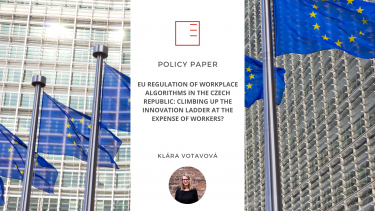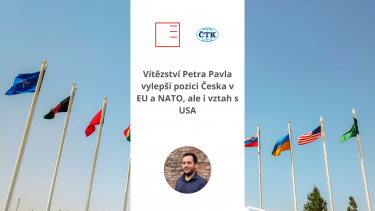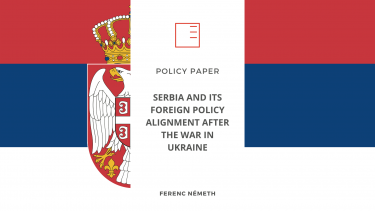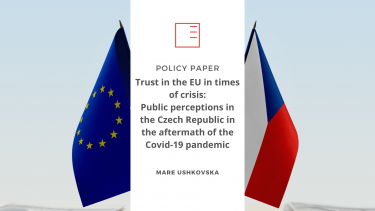SUMMARY OF EXPERIENCES WITH THE INVOLVEMENT OF CSOS IN V4 IN THE DECARBONISATION PROCESS
The project is focused on the examination of the role of non-governmental organizations in the process of decarbonization of coal regions in V4 countries (Czech Republic, Hungary, Poland, Slovakia). The aim of the project is to describe the best and worst practices of the individual processes for Serbia, who awaits the transformation of its energy mix, largely based on coal. The examined V4 countries have had a slightly different share of coal in their energy mix, while the largest one being in Poland and the second largest one in the Czech Republic, followed by Hungary and Slovakia. There are many similarities and differences in their takes on decarbonisation, thus providing different range of experiences.
Show more PDF

Report | Monitoring of the EU's Green Policies: Perceptions and Narratives in the Czech and Slovak Information Space
The European Green Deal is the core of the current climate strategy of the European Union, which has set the goal of making Europe a carbon-neutral continent by 2050. In an effort to monitor and counter disinformation narratives about the deal, IRI's Beacon project launched an initiative called the “European Green Deal: Mapping perceptions in Central and Eastern Europe,” in which six partner organizations studied how the deal is perceived in Bulgaria, Czechia, Poland, Romania, and Slovakia. Our project manager and juniour researcher, Tatiana Mindeková, analyzed narratives spread about the Green Deal and the EU’s green policies through Czech chain emails as well as through selected mainstream media and websites known for spreading disinformation.
Show more PDFPolicy Paper | EU Regulation of Workplace Algorithms in the Czech Republic: Climbing up the Innovation Ladder at the Expense of Workers?
Our researcher Klára Votavová has written a policy paper in which she discusses the new dilemmas concerning the balance of competitiveness and decent work standards in the Czech Republic, which are emerging with advancing digitalization and automation.
Show more PDFNational Convention on the EU | Recommendation: Formats of regional cooperation from the perspective of the Czech Republic
Our senior research fellow Jana Juzová and associate research fellow Zuzana Kasáková prepared a recommendation resulting from the round table discussion of the National Convention on the EU held on January 20, 2023 on the topic "Formats of regional cooperation from the perspective of the Czech Republic". The Convention produced recommendations based on the answers to the following questions: What position should the Visegrad Group have in Czech foreign policy? How should the Czech Republic approach other formats of regional cooperation in Central Europe? How should the Czech Republic use its involvement in European territorial cooperation?
Show more PDF
ČTK: Petr Pavel's victory will improve the Czech Republic's position in the EU and NATO, but also relationship with the USA
The head of our Brussels office, Žiga Faktor, commented for ČTK on Saturday's victory of Petr Pavel in the presidential elections on the relationship with the EU and NATO. He mentioned that Pavel's accession could bring about a unification of the foreign policy of the government and the Foreign Ministry. He also suggested that the newly elected president would have better relations with the United States
Show more
ČT24: The election result sends a signal about the pro-Western direction of the Czech Republic
The head of our Brussels office, Žiga Faktor, appeared on Czech Television to comment on the reaction of Brussels to the results of the presidential elections. He also mentioned the role of the president in relation to the EU and NATO and how this relationship will change after two terms of Miloš Zeman.
Show more
Policy Paper | Serbia and Its Foreign Policy Alignment after the War in Ukraine
Ferenc Németh, a researcher on the politics, security and integration of the Western Balkans, has written a policy paper under the project Think Visegrad in Brussels. In it he examines Serbia's foreign policy towards the European Union after the Russian invasion of Ukraine.
Show more PDFPolicy Paper | Trust in the EU in times of crisis: Public perceptions in the Czech Republic in the aftermath of the Covid-19 pandemic
How has the Covid-19 pandemic affected the Czechs' relationship with the European Union? This topic is addressed in a policy paper by visiting fellow Mare Ushkovska.
Show moreINVITATION | EU-Pacific Talks: Europe and the Indo-Pacific: Migration and demographic changes
We would like to invite you to a debate "EU-Pacific Talks: Europe and the Indo-Pacific: Migration and demographic changes", which will take place on 30 January at 13:00 online on our Facebook page.
Show more
VOXPOT: The EU, with Sweden at the helm, is heading into uncharted waters. Green Europe and migration solutions on the horizon
At the turn of the year, Sweden took over the Presidency of the Council of the EU from the Czech Republic and will be responsible for leading the Union for the next six months. Although the Swedes have a reputation for being solid and liberal-minded partners, there are concerns about the great unknown because of the composition of their current government. For the first time in history, it is supported by the far-right Sweden Democrats. Our Senior Research Fellow Vít Havelka wrote this article for VOXPOT.
Show more
Staroměstské náměstí 4/1
Prague 1 - Staré Město
110 00
tel.: +420 212 246 552
email: europeum@europeum.org
https://www.europeum.org









